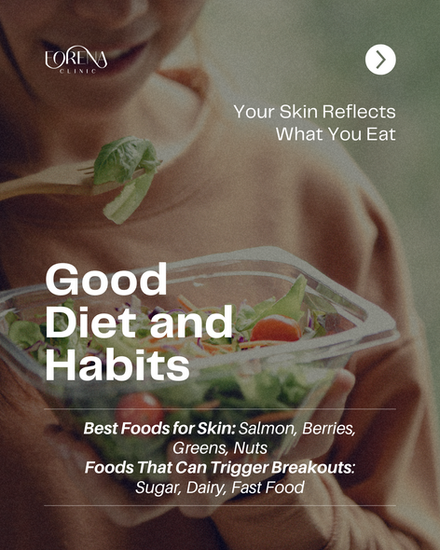Cystic Acne: What Works and What Doesn’t | Forena Clinic, Seoul
- Anh Pham
- Jul 25, 2025
- 3 min read
Cystic acne isn’t just “bad skin.” It’s a deep, painful, and often emotional condition that can impact confidence and leave long-term scars. Unlike typical pimples, cystic acne forms below the skin’s surface, making it harder to treat with over-the-counter products.
At Forena Clinic, we treat patients from around the world who have tried everything—but still deal with stubborn breakouts. Here’s what we’ve learned about what truly works… and what doesn’t.
What Works for Cystic Acne
1. Oral Medications
For moderate to severe cystic acne, prescription medications are often the most effective approach.
Isotretinoin (Accutane): One of the most powerful long-term solutions. It targets oil glands and inflammation at the root.
Spironolactone: Great for hormonal acne, especially along the jawline and chin.
Oral antibiotics: Help control bacteria and inflammation—but not for long-term use.
Tip: These must be prescribed by a doctor and monitored closely.
2. Cortisone Injections
If you have a painful, swollen cyst before a big event—a cortisone shot can shrink it in 24–48 hours. Fast, effective, and scar-preventing when done early.
3. Laser & Advanced Energy Treatments
While lasers can’t treat active cysts directly, they play a powerful role in reducing post-acne marks, pigmentation, redness, and preventing future breakouts by calming inflammation and boosting skin renewal.
Excel V: Targets redness, inflammation, and post-acne vascular marks.
Pico Laser: Breaks down pigment clusters and evens out skin tone from old acne scars.
Potenza (RF Microneedling): Stimulates deep collagen remodeling, tightens pores, and helps reduce acne scars and sebum production.
TheraClear: Combines vacuum suction and broadband light to deeply cleanse pores, kill acne-causing bacteria, and reduce active inflammation—especially helpful for oily, acne-prone skin.
These treatments are most effective when customized to your skin’s current condition—especially post-inflammatory pigmentation, scarring, and recurring breakouts.
4. Professional Skincare and Chemical Peels
Medical-grade retinoids and acid peels help with clogged pores and scarring, but should only be used under guidance.
BHA peels (like salicylic acid) penetrate deeper and are anti-inflammatory.
5. Consistency + Barrier Repair
Cystic acne is not cured overnight. Your skin needs a calm, consistent routine that balances exfoliation with hydration and barrier support.
What Doesn’t Work (or Makes It Worse)
1. Popping or Squeezing Cysts
This only forces the infection deeper, leads to inflammation, and guarantees scarring.
2. Harsh Scrubs & Overwashing
Stripping your skin’s barrier leads to more oil production and breakouts. Skip the physical exfoliants and drying cleansers.
3. DIY Remedies (Toothpaste, Lemon, etc.)
These may feel tingly but can burn or irritate the skin—especially if you have active cysts.
4. Acne Patches
Great for surface pimples, but completely ineffective for deep cysts.
How Diet Affects Cystic Acne
What you eat doesn’t cause acne—but it definitely can influence it.
🟢 Foods That May Help:
Omega-3s: Salmon, chia seeds, walnuts (reduce inflammation)
Zinc-rich foods: Pumpkin seeds, lentils (help with oil control)
Probiotics: Yogurt, kefir, kimchi (support gut health → better skin)
Low GI carbs: Sweet potatoes, quinoa, vegetables (stabilize insulin)
🔴 Foods to Avoid:
Dairy: Especially skim milk, which can trigger hormonal acne
Sugar & refined carbs: Spike insulin and worsen inflammation
Whey protein: Common acne trigger in bodybuilders or gym-goers
Fried/processed foods: Increase systemic inflammation
Pro tip: Try keeping a 2-week food + skin journal to spot personal triggers.
Don’t Forget the Basics
Sunscreen (SPF 30+): Every day, even if it’s cloudy. Inflammation + UV = worse scars.
Moisturize: Yes, even if you’re oily. Dehydrated skin produces more oil.
Sleep & stress: Chronic stress and poor sleep spike cortisol and acne.
When to See a Dermatologist
If you’ve tried drugstore products for months and still have:
Painful, recurring cysts
Scars or pigmentation
Acne that’s impacting your confidence
→ It’s time to get professional care.
Ready to Treat Cystic Acne the Right Way?
Clinic Information
📍 Address
7F, 140 Yanghwa-ro, Mapo-gu, Seoul, South Korea(1-minute walk from Hongdae Station, Exit 9)
🌐 Website
📱 Social Media
Facebook: @forenaclinic
TikTok: @forenaclinic
Instagram: @forenaclinic
YouTube: @forenaclinic
💬 Messaging Apps
WhatsApp / Telegram / KakaoTalk: +82 10-2776-3095

















Comments